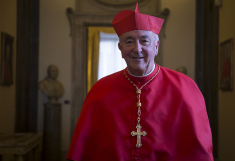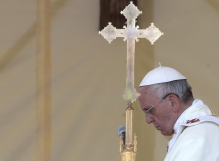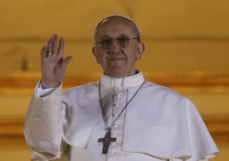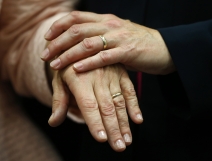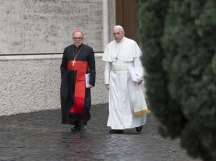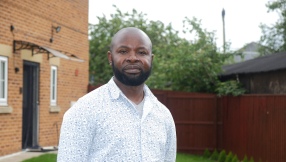The Catholic Church has signalled it could be moving towards a liberalisation of its ban on divorced and remarried people receiving Holy Communion, to the growing anger of the conservative wing.
Commentators believe a softening of the outright ban on artificial birth control, already ignored by most lay Catholics, is also possible, after the first official document emerged from Rome today.
The mid-term report presented at the start of the second week of the Extraordinary Synod on the Family was welcomed by liberal commentators but condemned by the conservative group Voice of the Family as a "betrayal".
Francis X Rocca of Catholic News Service said the document used "strikingly conciliatory language on situations contrary to Catholic teaching" and emphasised calls for greater acceptance and appreciation of divorced and remarried Catholics, cohabitating couples and homosexuals.
Writer John Thavis described it as an "earthquake", the "big one" that hit after months of smaller tremors.
The relatio post disceptationem was read aloud to the 200 bishops meeting in the synod hall at the Vatican.
Thavis noted that while defending traditional doctrine, it also called on the Church to build on positive values in unions that the Church has always considered "irregular" including cohabitating couples, second marriages after divorce and even homosexual unions.
"Regarding homosexuals, it went so far as to pose the question whether the church could accept and value their sexual orientation without compromising Catholic doctrine."
The document will be finalised this week then used for reflection around the world for a year, before the next stage in the process begins, at another synod next October, where the theme will be "the vocation and mission of the family in the church and the modern world."
Presenting the report this morning, the General Rapporteur, Cardinal Peter Erdő, said Jesus taught marriage was indissoluble, but showed understanding of those who didn't live up to this ideal.
The Church had to consider "whether there are positive elements in irregular marriages," he added.
Cardinal Erdő said many synod members expressed the need for reformed, simplified procedures for annulments.
Regarding divorced and divorced and civilly remarried Catholics, the report speaks of the need for "courageous pastoral choices" and "new pastoral paths", calling for case-by-case discernment.
The report noted that a couple choosing to cohabit might indicate commitment-phobia, but is also a choice that is taken "while waiting for a secure existence" such as a steady job and income. The Cardinal said the Synod Fathers also noted that homosexual persons have gifts and talents to offer the Christian community and that pastoral outreach to them is an important educative challenge.
John Smeaton, co-founder of Voice of the Family, said: "Those who are controlling the Synod have betrayed Catholic parents worldwide. We believe that the Synod's mid-way report is one of the worst official documents drafted in Church history.
"Thankfully the report is a preliminary report for discussion, rather than a definitive proposal. It is essential that the voices of those lay faithful who sincerely live out Catholic teaching are also taken into account. Catholic families are clinging to Christ's teaching on marriage and chastity by their finger-tips."
Patrick Buckley, Voice of the Family's Irish representative, said: "The Synod's mid-way report represents an attack on marriage and the family. For example, the report in effect gives a tacit approval of adulterous relationships, thereby contradicting the Sixth Commandment and the words of Our Lord Jesus Christ on the indissolubility of marriage.
"The report undermines the Church's definitive teaching against contraception, by using the coded language of 'underlin[ing] the need to respect the dignity of the person in the moral evaluation of the methods of birth control". This language is the code of those who wish to reduce the Church's doctrines to a mere guide, thus leaving couples free to choose contraception in so-called 'conscience'.
"The report accepts wrongly that there is a value in the homosexual orientation." This contradicts the Congregation of the Doctrine of the Faith's 1986 letter which condemned homosexuality as ordered towards an intrinsic moral evil, he said.
"Although the particular inclination of the homosexual person is not a sin, it is a more or less strong tendency ordered toward an intrinsic moral evil; and thus the inclination itself must be seen as an objective disorder."
Maria Madise, Voice of the Family's coordinator, said: "What will Catholic parents now have to tell their children about contraception, cohabiting with partners or living homosexual lifestyles? Will those parents now have to tell their children that the Vatican teaches that there are positive and constructive aspects to these mortal sins? This approach destroys grace in souls.
"It would be a false mercy to give Holy Communion to people who do not repent of their mortal sins against Christ's teachings on sexual purity. Real mercy consists of offering people a clean conscience via the Sacrament of Confession and thus union with God.
"Many of those who claim to speak in the name of the universal Church have failed to teach the faithful. This failure has created unprecedented difficulties for families. No responsibility is taken for this failure in this disastrous mid-way report."
"The Synod's mid-way report will increase the incidence of faithful Catholics being labelled as 'pharisees', simply for upholding Catholic teaching on sexual purity."










